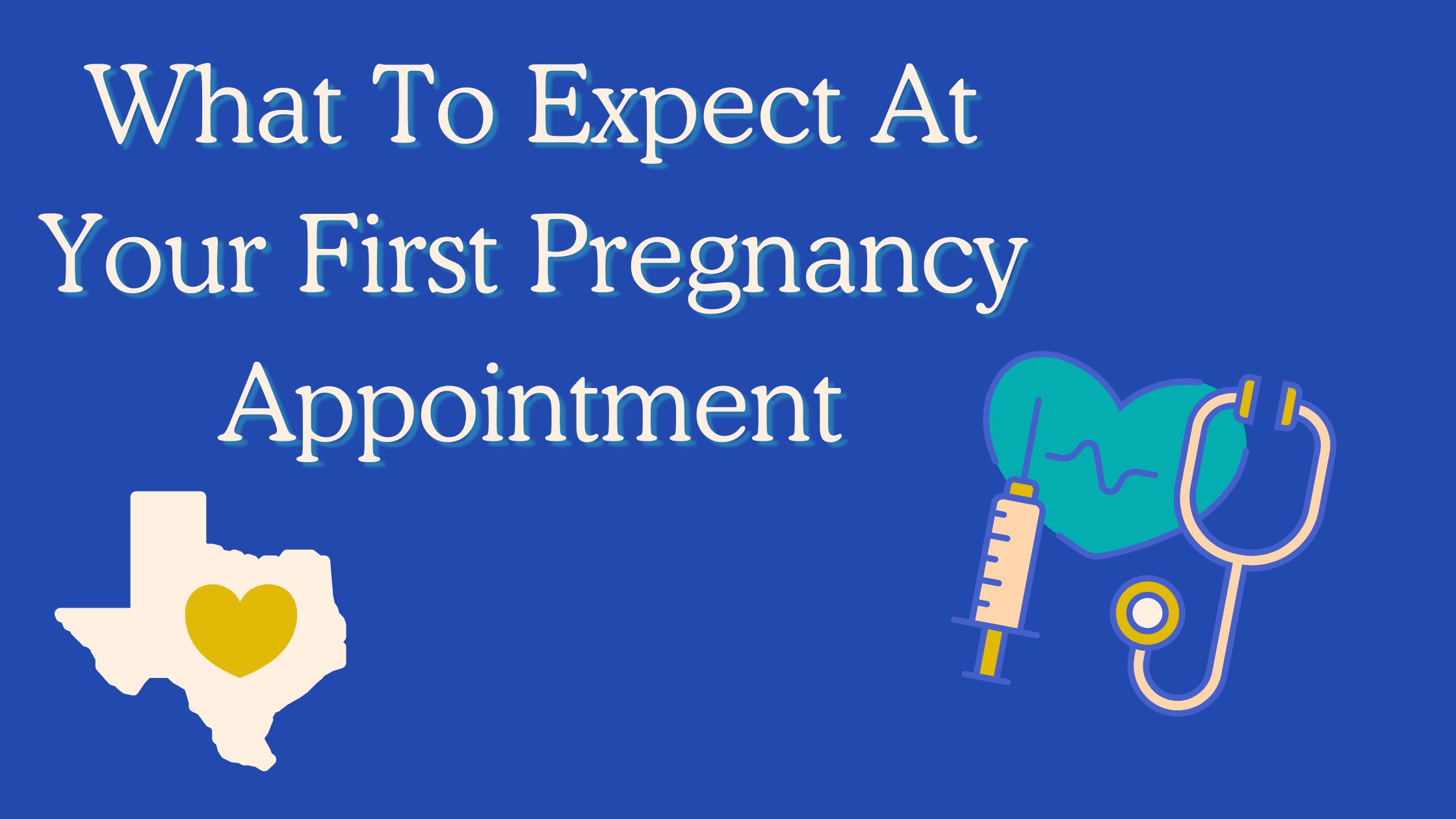
Your first pregnancy appointment is a big milestone—it’s often when everything starts to feel real. Whether you’re feeling excited, nervous, or unsure, this first visit is about learning what’s happening with your body, asking questions, and building trust with your medical team to ensure a healthy pregnancy.
During this initial prenatal visit, you’ll meet with a health care provider who will review your medical history, take some baseline measurements, and run early lab tests, including a pregnancy test, urine sample, and blood draw. During this visit, your provider will be able to give you an idea of how many weeks pregnant you are, and will estimate your due date. You’ll also have the opportunity to ask questions, share your concerns, and start planning what comes next in your care and baby’s growth.
This visit isn’t just about medical information—it’s about support. Many women feel anxious walking into their first visit, especially if they’re navigating an unplanned pregnancy or unsure what they want for their future. No matter where you are emotionally, this guide will walk you through what to expect, how to prepare, and possible questions to ask your doctor.
Sharing Your Medical History at Your First Prenatal Visit

When you arrive for your first prenatal visit, your provider’s first goal is to learn as much as possible about your medical history. This information helps them understand your overall health and create a personalized care plan for the rest of your pregnancy.
You’ll likely fill out intake forms covering:
- Personal medical history: existing conditions, previous pregnancies, allergies, surgeries, medications, and supplements.
- Family medical history: inherited conditions such as diabetes, heart disease, or genetic disorders.
- Gynecologic and obstetric history: past pregnancies, miscarriages, menstrual cycle patterns, or fertility treatments.
- Lifestyle details: diet, physical activity, tobacco or alcohol use, and any stress factors that could affect your health.
This is also when your provider may ask about any mental health concerns, like anxiety or depression. Honest answers allow your care team to offer the right support and referrals if needed.
If you’re taking prescription or over-the-counter medications, bring a full list—name, dosage, and frequency—so your provider can confirm they’re safe for pregnancy. Some medications and herbal supplements need to be adjusted or replaced to protect you and your baby’s development.
Your first prenatal visit sets the foundation for open communication. You can ask questions about what’s normal in early pregnancy, which symptoms deserve a call, or how to handle daily routines like exercise or nutrition. A good provider relationship starts here—with honesty, comfort, and trust on both sides.
What Happens During the Physical Exam
After reviewing your medical history, your provider will likely complete a brief physical exam. This step gives your healthcare team a baseline for how your body is adjusting to pregnancy and helps identify any early concerns that might need extra monitoring later in the first trimester.
At your first prenatal visit, you can usually expect:
- Vitals: your height, weight, and blood pressure will be recorded to establish a baseline.
- Urine sample: tests for protein, sugar, and infection—key markers for kidney function and gestational conditions.
- Pelvic exam: allows your provider to check your uterus, cervix, and vagina to ensure everything looks healthy. They may also perform a Pap test if you’re due for one.
- Breast exam: sometimes included to note any changes and prepare for future lactation discussions.
If this is your first time meeting the provider, it’s okay to talk about comfort and consent. You can ask what each part of the exam involves and request to stop or slow down if you feel uncomfortable.
Your provider’s goal is to help you feel safe, informed, and respected—not rushed. Every question you ask, such as, “Is this normal?” or “When will I feel movement?” is worth asking. The first appointment sets the tone for a healthy and supportive pregnancy journey.
Blood Tests and Lab Work at Your First Prenatal Appointment

Your first prenatal appointment usually includes several blood tests and other routine lab tests that help your provider learn about your overall health and how your pregnancy is progressing. These screenings give important insight into both your wellbeing and your baby’s early development.
Here’s what your provider may check:
- Blood type and Rh factor: determines if your blood is Rh-positive or negative. If you’re Rh-negative, your provider may discuss medication later to protect your baby’s health.
- Complete Blood Count, Hemoglobin & hematocrit: checks for anemia (low red-blood-cell levels), which is common in pregnancy.
- Immunity tests: ensure you’re protected against illnesses like rubella and chickenpox.
- Infectious disease screening: identifies possible infections such as HIV, hepatitis B, or syphilis early on, so treatment can begin promptly.
- Thyroid and blood sugar levels: helps assess metabolism and rule out gestational diabetes risks.
- Urine tests: measure sugar, protein, and signs of infection or dehydration.
These lab tests are a normal part of prenatal care and give your healthcare team essential information to guide your treatment safely.
If you’re paying out of pocket or using a self-pay option, ask your provider about pricing in advance—many clinics can give cost estimates or direct you to community programs that help cover costs.
Understanding what’s being tested helps you feel more involved and confident in your care plan. Remember, these early screenings are designed to ensure you and your baby start pregnancy on the healthiest path possible.
Your Care Provider’s Role in the First Trimester

During the first trimester, your care provider becomes your main source of reassurance, education, and medical guidance. This person—whether an OB-GYN, family physician, or certified nurse-midwife—plays a key role in helping you understand your body’s changes, protecting your health, and setting the tone for a positive pregnancy experience.
At your first few visits, your care provider will:
- Explain your results from early lab tests and screenings.
- Monitor your health, including weight, blood pressure, and any early symptoms such as nausea or fatigue.
- Offer advice on prenatal vitamins, nutrition, and safe physical activity.
- Discuss emotional well-being and connect you to counseling or community support if you’re feeling overwhelmed.
This relationship is built on trust and open communication. If something feels uncomfortable—whether a procedure, a question, or the pace of the appointment—let your provider know. You have the right to informed consent, clear explanations, and respectful treatment.
For some pregnant women, the first trimester can be filled with both excitement and uncertainty. Your care provider is there to guide—not judge. They can also refer you to additional healthcare resources, such as dietitians, financial counselors, or social workers who specialize in prenatal support.
If you’re still processing the news of your pregnancy or unsure about next steps, you can connect with us here at, Texas Adoption Center, where we offer compassionate guidance for women exploring all options—including adoption, should parenting not feel possible right now.
The Early Ultrasound and Confirming Your Due Date

One of the most anticipated parts of your first appointment may be the early ultrasound. This scan allows your provider to confirm that the pregnancy is developing normally and to estimate your due date more accurately.
In most cases, your provider will recommend a transvaginal ultrasound during the first trimester, usually between six and eight weeks. At this stage, the embryo is still very small, but the ultrasound can often detect a gestational sac, the fetal pole, and sometimes even early fetal cardiac activity—the tiny flicker that shows your baby’s heartbeat.
Using these measurements, your care provider can estimate your due date based on the size and development of the embryo rather than just your last menstrual period. This is especially helpful if your menstrual cycle isn’t regular or if you’re unsure when conception occurred.
Sometimes, it’s too early to see much on the first scan, and that’s okay. Your provider may schedule a follow-up ultrasound in a week or two to check for growth and confirm dating. Early ultrasounds are also used to:
- Verify the pregnancy is located inside the uterus (not an ectopic pregnancy).
- Check whether you’re expecting one baby or multiples.
- Establish a visual baseline for fetal development.
If you’re feeling anxious before your scan, that’s completely normal—especially if this is your first time hearing medical terms or seeing images of your developing baby. Don’t hesitate to ask your provider to explain what you’re seeing or to print a photo for your records.
Your first ultrasound marks the beginning of your care journey. Whether this appointment fills you with excitement or uncertainty, take comfort in knowing that your healthcare team is there to guide you through each step, answer every question, and support you as you plan your next visit.
Other Tests You May Discuss at Your First Visit
Depending on your age, medical history, and risk factors, your provider may suggest other tests during or after your first visit. These aren’t required for everyone—they’re optional screenings that can help identify potential health issues early.
Here are a few common ones:
- Genetic carrier screening: Looks for inherited conditions such as cystic fibrosis, sickle-cell disease, or Tay-Sachs.
- Early prenatal genetic testing (NIPT): A simple blood draw that analyzes small fragments of your baby’s DNA to check for chromosomal differences, and potential conditions such as down syndrome.
- Pap smear and HPV screen: If it’s been more than three years since your last cervical cancer screening, your provider may recommend one.
- STI testing: Even if you’re symptom-free, sexually transmitted infections may still be present. These tests are a safe way to protect your baby and ensure early treatment if needed.
- Thyroid and vitamin level checks: May be added if you’ve had fatigue, irregular cycles, or prior hormone concerns.
Your care provider will explain what each test does, why it may be recommended, and whether insurance covers it. You always have the right to ask questions, delay testing, or decline anything you’re not comfortable with.
If you’re unsure which other tests to choose, consider what will help you feel most at ease. Some women prefer the reassurance of more information; others focus on standard screenings only. The key is open communication with your provider—every decision should align with your comfort, beliefs, and needs.
Healthcare Costs and Insurance Options
Understanding how healthcare costs work during pregnancy can ease a lot of early stress. At your first appointment, the clinic will likely ask for your insurance information or discuss payment options if you’re uninsured.
If you have insurance, your provider’s billing team can confirm:
- Whether the office and hospital are in-network.
- What your copay or deductible will be for prenatal visits.
- Which lab tests and ultrasound services are fully or partially covered.
If you’re uninsured, don’t panic. Many hospitals and clinics in Texas offer self-pay discounts, payment plans, or connect you with public programs such as Medicaid for Pregnant Women, CHIP Perinatal, or local charity-based care. Your care provider or social worker can also help you apply for temporary assistance or find affordable prenatal programs.
It’s also important to ask about cost transparency. You can request an itemized estimate before each visit so you understand what to expect. Clinics are used to these questions—asking shows that you’re informed and proactive.
If you’re unsure how to navigate insurance or coverage, Texas Adoption Center can connect you with healthcare partners and community organizations that help expectant mothers manage prenatal costs. Support is available whether you’re planning to parent or considering adoption, and you deserve to feel confident and secure throughout your pregnancy journey.
Preparing for the First Prenatal Appointment: Checklist & To-Do Plan

Walking into your first prenatal appointment prepared can help you feel more confident and calm. Having the right information and materials on hand ensures your provider can give you the most personalized care possible.
What to Bring
- Photo ID and insurance card (or self-pay information)
- List of current medications and supplements, including dosages
- Date of your last menstrual period (used to estimate gestational age and due date)
- Family medical history notes, especially if you know of genetic conditions
- Questions or concerns written down so you don’t forget them
Questions to Ask
It’s normal to feel unsure of what to ask your care provider—here are a few ideas:
- How often will I have appointments in the first trimester?
- What symptoms are normal and which ones should I call about?
- Can I exercise, travel, or keep taking certain medications?
- What are my options for lab tests or other screenings?
- How can I reach someone after hours if I have a question or emergency?
Your “This Week” To-Do Plan
- Schedule your appointment as soon as possible (ideally by 8 weeks of pregnancy).
- Begin taking prenatal vitamins with folic acid if you haven’t already.
- Write down key dates (like your first visit and estimated due date).
- Plan transportation and childcare, if needed, to reduce stress on appointment day.
- Check insurance coverage or ask about self-pay options to avoid surprises.
You can also download or create a simple printable checklist—a one-page reminder of what to bring, questions to ask, and next steps after your visit. Having everything in one place helps you stay organized through the busy early weeks of pregnancy.
You’re Not Alone: Texas Adoption Center Can Help
Your first pregnancy appointment is a big step—one that can bring relief, new questions, or a mix of both. No matter how you feel, you deserve support that honors your emotions and your choices.
If you’re still processing your pregnancy or exploring your next steps, we’re here for you. Our caring team provides confidential, judgment-free guidance, helping you understand your options, connect with medical and emotional resources, and build a plan that feels right for you and your baby. Let’s discuss your needs.






